When I first saw the trailer for Stellaris: Nexus, I honestly didn’t know what to think. On one hand, the idea of taking such a massive game like Stellaris and squeezing into just one hour sounds like madness. On the other hand, the idea of taking Stellaris and speeding it up so I can play it with friends sounds amazing. Even though I have… more time than I care to admit logged playing the base game, I've only played through to completion twice.
Fortunately, we’ve been able to get a sneak peak during Steam’s last Next Fest, and after playing against the computer and other players in their demo, I have a lot of thoughts. Stellaris: Nexus has the potential to be a game that a lot of people will love, and it will also be a game some people abhor for all of the daring shortcuts it attempts.
Saving An Empire By Blowing Part Of It Up

That's it - that's the whole game!
The first thing to wrap your head around is that Nexus is not trying to be Stellaris. In the original game, you are a small fish in a huge pond, learning how to explore the galaxy and find your place in it. In Nexus, the premise shifts that there had been an empire which kept a semblance of galactic peace. Now, that empire has collapsed, and the surrounding factions have been tasked with proving their worth. To win a game, you must accumulate 100 ‘succession’ points before your rivals do.
How do you get succession points? Well, there are a lot of ways. Every seven turns, the council meets to award out points, and all the contenders can vote for new awards to try and earn. For example, there might be an award to earn 12 succession points by owning the most starbases, or exploring the most anomalies. You can also earn two or three points by being diplomatic with neighbors, having a dominant culture, or building fancy megastructures later in the game.
However, the main way succession points are earned (And as a way to ensure the clock keeps ticking down) is by controlling Nexus, the ancient capital city in the center of the map. Own that, and every 7 turns you get 12 points. It’s hot real estate, and it forces everyone to focus in towards the center of the map.

(If this looks and sounds like a particular board game, we’ll get to that in a minute, I promise.)
Galaxy Building In (Less Than) 60 Seconds
Every seven turns goes by fast. Especially since when you are playing multiplayer, each turn is locked in at only taking 45 seconds. This is empire creation at a breakneck speed, where you are looking to expand and optimize immediately. By the time the first council has met, you might have already built a new fleet, expanded to having three planets, and begun to meet your neighbors.
This is possible through a genius system of resource management. Your main resource is ‘Support’, which is a catch all phrase for population, bureaucracies, and your approval rating. You spend this Support whenever you do anything in the game: move a fleet on your turn? One Support. Want to move another fleet? Go ahead, but it will cost one Support… plus one more for each other action you’ve taken this turn. It feels like an Action Point system you would find in a strategy RPG, it’s used for empire building instead.
Other two resources, Materials and Currency, are a lot more straight forward. Materials you’ll need to build and reinforce fleets, construct buildings, and more. Meanwhile, Currency is sort of a wildcard, being able to be used as Support or Materials. You get this through trade deals, advanced buildings, and more. You need a healthy balance to start, but as the games continue, having a stash of Currency is what keeps you in the race.
On top of all of this is the Edict system, which is the real way you will win or lose. Each turn, your empire is given a handful of possible actions to take instead of having access to all the possibilities at once. Research? It costs you support and materials, but you can only research whenever it comes up in your hand. Construction of new shipyards or districts? Need to wait to draw that particular edict card.
When Limitations Aren’t A Bad Thing

This Edict system seems perhaps a little counter-intuitive, especially if you are a diehard fan of the base Stellaris game. Part of the fun of a grand strategy game is in how developers constantly stacks options and choice on the player, allowing for people to try winning in what feels like an infinite amount of ways. However, the design choices for Nexus are all based around competition and speed, leading to a very different experience.
There are six factions in the game, each familiar to fans of the original. Each specializes in a particular style, such as military action or science; this also changes their edict deck. The Voor Technocracy has more chances to draw research, while the basic human faction gives more flexibility at the cost of needing more resources. Now, despite the limitations of this shorter game, developers have baked into the game’s systems a sense of variety that is immediately felt when you change factions.
This limitation of edict options helps you not feel paralyzed as a player to end a turn, rather than (at least in my case), constantly pausing the game to research every possibility in the original game. It’s a lot easier to decide what to do if I only have five support points and six options of what to do on my turn. For me, it really did make the game faster without feeling too rushed, and I enjoyed how it let me feel like I was building a space-faring nation at breakneck speed.
Stellaris Nexus Is A Board Game, And That’s Okay
There are a lot of other genius things this game does, such as keeping track of diplomatic power to allow players to vote on victory point awards whenever the senate meets, making each game feel varied despite the much more set map design. Is someone running rampant with a massive military? Maybe everyone just votes to give victory points to those who focus on research or construction instead! Checks and balances abound as everyone races towards that set point of 100 supremacy points to become the new leader of the galaxy.
Now, there is a very, very good chance that people have recognized a lot of the gameplay mechanics I’ve been writing about, and that’s because of a little board game known as Twilight Imperium. In it, players all vie for control of a central planet while trying to rack up victory points, there’s chances to change various victory conditions… in many ways, Stellaris: Nexus feels like it filed off a few serial numbers in terms of its mechanics and basic premise.

Personal Opinion - playing Stellaris: Nexus as an online alternative to planning a full day event to play the Twilight Imperium board game isn't a bad sell either.
Honestly, this is both good and bad. Twilight Imperium is a massive, massive board game, one that is infamous for taking an entire day to play. It’s a very good board game, but it's also exhausting, with there being a lot of set up and management between turns. In my opinion, this makes Nexus even more appealing, since a video game takes care of that administrative time for you. I only played multiplayer Nexus a few times, but it really did only take just an hour thanks to the turn time limits. When I play this video game, It’s like I’m getting a distillation of the 'paint the map' Stellaris gameplay and the board game I love... but a board game I just can’t carve out a full day for to play with friends.
On the negative side however… well, look at the last comment: this is a distillation of the original Stellaris with a set number of victory points. It has a limited map and condensed, focused gameplay which helps keep games short, but it also trims away a lot of what makes the original Stellaris so special. In the original game, half the fun isn’t about points, or even winning: it’s about the exploration of a galaxy. It’s about having random events derail your entire civilization so they worship black holes or have to fight off an ancient fallen empire that’s four times your power level.
Stellaris: Nexus isn’t about telling those stories. It’s about getting to 100 supremacy points and getting there faster than anyone else. It takes away the roleplaying element of running a galactic empire and replaces it with a board-game or sports-game mentality. This change is going to make some people really happy, and turn others off entirely.
Stellaris: Nexus Is A Good, But Different Game Than It’s Namesake
I wanted to cover Stellaris: Nexus thoroughly because of how well loved the original game is. It felt mad that they would even try to take such a large game and narrow it down to just one hour.
After playing for multiple hours against the demo scenario and also against live opponents, I’m amazed at the feat they’ve managed to accomplish. I had an absolute blast playing against other people online, something I can’t imagine really doing with the base game due to its glacial pace. We were laughing and chatting about how we all thought about Nexus, and everyone had good things to say about it! Good, but with a slight note of “I’m not quite sure how good.”

Shout out to the people I played multiplayer while the demo was available: I really enjoyed the back and forth of talking strategies with some solid trash talking happening too.
Nexus is fun. It’s still not out yet, and it still needs more polishing and optimization: a few extra visuals and a cleaned up UI would do wonders. It has six factions so far, but it needs to make sure its various factions feel unique and that there is enough variety to keep people coming back. In terms of variety, Nexus would do well to make sure there’s some sort of single player campaign or conquest mode to again, add more ways to play.
In the end, I like it. I might even love it when I see the final product, but we don’t yet have an end release date or a price point. If it’s a cheap 15-25 dollar game, I’ll probably be recommending it to many, many friends who love Twilight Imperium, who just want a good space themed board game to play easily. For all you original Stellaris fans? Keep an eye on this one. When it comes out, it might be something that isn’t quite your speed… or it could be a really fun fresh take on a game you already love. Right now, only time will tell.